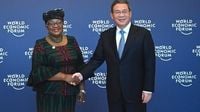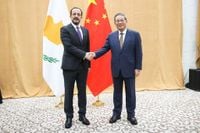At the 80th session of the United Nations General Assembly in New York this week, a subtle but significant shift in China’s diplomatic playbook has come into sharp focus. While the world marked eight decades since the UN’s founding—a moment ripe for major-power pageantry—China’s President Xi Jinping stayed home, delegating the international spotlight to his premier, Li Qiang. It’s a move that speaks volumes about the evolving nature of Chinese leadership, the country’s ambitions for global governance, and the high stakes of today’s international order.
Premier Li Qiang’s presence at the UN was more than a matter of protocol. According to China Daily, on September 24, 2025, Li reaffirmed China’s steadfast support for the United Nations, emphasizing the need for the world body to play a “greater role in international affairs.” He met separately with UN Secretary-General Antonio Guterres and Annalena Baerbock, President of the 80th Session of the General Assembly, bringing China’s message of multilateralism to the heart of global diplomacy. Li’s agenda was packed: he also held talks with European Commission President Ursula von der Leyen, Canadian Prime Minister Mark Carney, Austrian Chancellor Christian Stocker, and Bill Gates, underscoring China’s intent to deepen both multilateral and bilateral cooperation.
The theme of this year’s General Assembly, “Better together: 80 years and more for peace, development and human rights,” resonated strongly in a world facing what Guterres described as “seismic changes.” The Secretary-General’s opening remarks, quoted in China Daily, recalled the UN’s founding vision: “Eighty years ago, from the ashes of war, the world planted a seed of hope. One Charter, one vision, one promise: that peace is possible when humanity stands together.” Yet, as the deliberations unfolded, it was clear that today’s challenges—ranging from the conflicts in Gaza and Ukraine to climate change and the disruption wrought by artificial intelligence—call for renewed commitment to multilateral cooperation.
China’s approach, as articulated by Li, centers on the Global Governance Initiative (GGI), a framework proposed by President Xi Jinping. The GGI, according to China Daily, is rooted in the principles of sovereign equality, international rule of law, multilateralism, a people-centered approach, and real results. It aims to make global governance “fairer, more inclusive and more effective,” especially at a time when, as Li warned, “unilateralism and protectionism are undermining the world economy and seriously hindering the implementation of the UN 2030 Agenda for Sustainable Development.”
Li’s remarks carried an unmistakable call to action, particularly for the Global South. He urged these nations to “raise a stronger voice of justice, and jointly oppose bullying and hegemony to safeguard the legitimate rights and interests of all countries.” The message was clear: China sees itself not only as a champion of developing nations but also as a defender of a rules-based international order—albeit one that reflects a multipolar reality.
Guterres, for his part, expressed gratitude to President Xi for delivering an important video address at the UN Climate Summit. The Secretary-General told Li that the UN “highly values and looks forward to strengthening its cooperation with China to firmly uphold multilateralism, safeguard the UN Charter and international fairness and justice, and promote the cause of global development.”
But perhaps the most intriguing subplot was President Xi’s own absence from the proceedings. As reported by the Associated Press, Xi’s decision to skip the General Assembly—despite it being the UN’s 80th anniversary—marks a notable departure from his earlier years as China’s globe-trotting leader. Xi had previously addressed the UN in person in 2015 and by video in 2020 during the pandemic. In recent years, however, he has dramatically reduced his overseas appearances, skipping the G20 in India and the BRICS summit in Brazil, and instead sending trusted lieutenants like Li Qiang to represent China.
Why the change? Analysts cited by the AP suggest several factors. Neil Thomas of the Asia Society Policy Institute described Xi’s reduced travel as a “strategic move to conserve his energy as he ages and ultimately strengthens his hold on power because he’s in Beijing more and is in better health.” Alfred Wu, a political expert at the National University of Singapore, noted that Xi’s leadership style has become more “oracular,” with loyalists like Li Qiang tasked to implement policy rather than shape it. “He’s delegating,” Wu observed. “It’s not a decentralization or structural change. He’s just asking people to do things on his behalf.”
Li Qiang’s ascent to the premiership in 2023 was itself striking. As Shanghai’s top official, he managed the city’s stringent two-month COVID-19 lockdown—a period marked by hardship and protest. Rather than being sidelined, Li was promoted, a testament to the premium placed on loyalty in Xi’s inner circle. Now, as premier, Li is emerging as a key interlocutor for foreign governments and multinational companies seeking to engage with China.
During the UN meetings, Li made headlines by announcing that China would “no longer seek developing country advantages in global trade talks,” signaling a shift in China’s posture as its economic clout grows. Meanwhile, President Xi reserved the high-profile climate issue for himself, delivering a video message outlining China’s climate goals for 2035. This division of labor, as experts note, allows Xi to retain ultimate authority while projecting China’s commitment to global leadership.
On the multilateral front, China’s message was one of reform and renewal. Li told Baerbock that Beijing supports “building the UN into a more effective and pragmatic international body through reform efforts to enhance its quality and performance.” Baerbock, in turn, acknowledged China’s “leading role in promoting global development and addressing global challenges,” and affirmed the General Assembly’s adherence to the one-China principle regarding Taiwan.
In his meeting with Ursula von der Leyen, Li emphasized the need for China and the EU to “enhance mutual trust, treat each other with sincerity, honor commitments and uphold the principle of seeking common ground while shelving differences.” Von der Leyen responded positively, expressing the EU’s willingness to “actively implement the consensus reached during this year’s China-EU leaders’ meeting, resolve differences through dialogue and consultation, and achieve new cooperation outcomes in areas such as trade and investment, environmental protection and development aid.”
Li’s dialogue with Bill Gates highlighted another dimension of China’s global engagement: the importance of practical cooperation with the United States. Li told Gates that “the sound and stable development of China-US relations benefits not only the two countries but also the world at large.” Gates called US-China ties “one of the most important bilateral relationships in the world today,” pledging to promote closer cooperation to tackle shared challenges.
As the week’s deliberations continue, the stakes could hardly be higher. The world’s governance architecture faces mounting deficits in peace, development, and trust. China’s call for a stronger, reformed UN—one that reflects the realities of a changing world—underscores the urgent need for more, not less, multilateralism. Whether the seeds of hope planted eight decades ago will flourish in today’s turbulent soil remains to be seen, but one thing is clear: China intends to play a central role in shaping the future of global governance.





